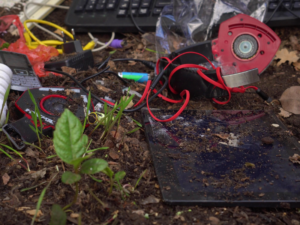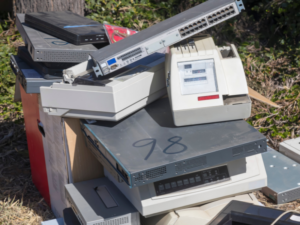Technology has greatly improved our lives, but progress can be hard to maintain. Every year, companies release new devices that make last year’s models instantly obsolete. The average consumer upgrades to a new cell phone once every two years and a new computer every three to five years. So what happens to the old ones? All too often, they become part of the 50 million metric tons of electronic waste (or e-waste) improperly discarded in landfills every year. And while many people adopt an “out of sight, out of mind” mindset when it comes to e-waste disposal, this way of thinking is incredibly harmful.
Keep reading to learn about the effects of not recycling e-waste and how Newtech Recycling can help.
The Impact of Technology on the Environment
With improper electronic waste disposal accounting for 70% of landfill soil pollution, we recognize this as a major environmental and public health crisis. Many hazardous materials are used to manufacture even common electronic devices like computers. For instance, did you know that computer components can include lead, mercury, cadmium, and chromium? All of these can cause devastating harm when exposed to the earth or human body.
So, why is this e-waste recycling so essential? How does e-waste impact the environment? Below, we’ll explore the full extent of the negative ramifications of not recycling e-waste and the impact technology has on the environment.
1. It Turns the Air into Poison Gas
There’s a good reason why most states today have e-waste laws. The threat e-waste poses to the environment is not confined to the future. It is immediate. When toxic contaminants are introduced into the atmosphere, either through burning (a common method of waste disposal in unregulated areas) or as particles released during improper dismantling, they can travel thousands of miles. These deadly fumes are a leading cause of respiratory illness, and have also been linked to cancer and other chronic conditions.
2. It Pollutes the Water We Drink
Just because you don’t live near a landfill doesn’t mean computer waste and the environment shouldn’t concern you. Just as airborne pollutants can travel surprisingly far on wind currents, e-waste contaminants can make their way into rivers, lakes, and reservoirs. This occurs when rainwater dissolves electronic components such as barium and mercury, which are then carried by the precipitation into various bodies of water. Even without rain, contaminants often leak through the earth into the groundwater. There, acidification wreaks havoc on underwater ecosystems. And it can do the same to us should it find its way into our drinking glasses.
3. It Seeps into the Soil and Our Food
Lead, mercury, and cadmium: these substances all have three things in common. First, they’re all components of electronic equipment. Second, they’re highly poisonous. Third, they’re part of a class of materials called heavy metals; with emphasis on the “heavy” part. Without proper IT hardware disposal, as computers and other devices decay, these heavy metals live up to their name, separating from other components due to their weight and sinking into the soil. Unlike other forms of waste that deteriorate quickly, e-waste pollutants can remain in the earth for much longer periods, harming microorganisms and absorbing into plant life. This includes vegetation that is used as food by both people and animals.
4. It Kills People Every Single Day
Unfortunately, the effects of not recycling e-waste are so severe that it even leads to death. The town of Guiyu is home to the largest e-waste disposal site in all of China, and possibly even the world. Because of poor regulation, e-waste environmental pollution has brought mass sickness and death to the citizens of Guiyu. Many members of the population exhibit severe respiratory, digestive, neurological, and bone diseases. Miscarriage rates are far above average, and 80% of the children who are born later go on to suffer lead poisoning. These horrors are not limited to Guiyu, however. They can be found anywhere and everywhere electronic devices are not properly disposed of. E-waste is not a localized problem. It is a global issue that endangers us all.
How We Can Help
Now that you know the effects of not recycling e-waste, you are probably interested in learning more about how you can properly dispose of these items. Fortunately, Newtech Recycling offers a better way of disposing of unwanted electronics, which helps preserve the environment for future generations while also benefiting mankind and the economy.
At our New Jersey Department of Environmental Protection-approved facilities, we use specially designed machinery to break down your broken desktop computer, old printers, and unwanted TVs into raw materials. Separated by type (aluminum, copper, glass, plastic, etc.), these materials can then be reused by the manufacturing industry for the creation of newer, better technologies.
When you use a certified recycling company, you can rest assured that all of your e-waste is being properly handled, and none of it is going to further pollute the environment. We reuse what we can, and properly dispose of what we cannot.
Recycle Your Electronics with Newtech Recycling
If you are an individual or business and you want to dispose of your unwanted technology safely and responsibly, Newtech Recycling will be there for you. We know how dangerous e-waste can be. That’s why we’ve dedicated ourselves to devising the most effective e-waste recycling process possible. Dangerous elements are disposed of properly, while reusable parts are returned to the manufacturing sector.
If you need help with electronics recycling in NJ, NY, CT, or PA, Newtech Recycling has the knowledge, experience, and equipment to guarantee your old tech is disposed of in a way that won’t harm the environment or your fellow humans.
Contact us today so we can work together for a better tomorrow!



